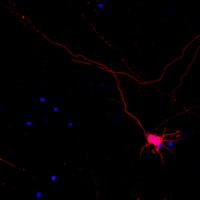Neuroprotective effects of mesenchymal stem cells derived from human embryonic stem cells in transient focal cerebral ischemia in rats.
Liu, YP; Seçkin, H; Izci, Y; Du, ZW; Yan, YP; Başkaya, MK
Journal of cerebral blood flow and metabolism : official journal of the International Society of Cerebral Blood Flow and Metabolism
29
780-91
2009
概要を表示する
Embryonic mesenchymal stem cells (eMSCs) were first derived from human embryonic stem cells (hESCs) overexpressing green fluorescence protein (GFP). They expressed CD29, CD44, CD73, CD105, CD166 and nestin, but not CD34, CD45, CD106 SSEA-4 or Oct3/4. Twenty million eMSCs in 1 mL of phosphate-buffered saline (PBS) were injected into the femoral veins of spontaneously hypertensive rats after transient middle cerebral artery occlusion. The migration and differentiation of the eMSCs in the ischemic brain were analyzed. The results revealed that eMSCs migrated to the infarction region and differentiated into neurons, which were positive for beta-tubulin III, microtubule-associated protein 2 (MAP2), HuC, neurofilament and human nuclear antibody, and to vascular endothelial cells, which were positive for von Willebrand factor (vWF). The transplanted cells survived in the infarction region for at least 4 weeks. Adhesive removal function significantly improved in the first week after cell transplantation, and rotarod motor function significantly improved starting from the second week. The infarction volume in the eMSC group was significantly smaller than that in the PBS control group at 4 weeks after infusion. The results of this study show that when administered intravenously, eMSCs differentiated into neuronal and endothelial cells, reduced the infarction volume, and improved behavioral functional outcome significantly in transient focal cerebral ischemia. | 19209181
 |









